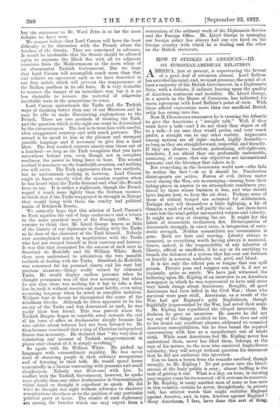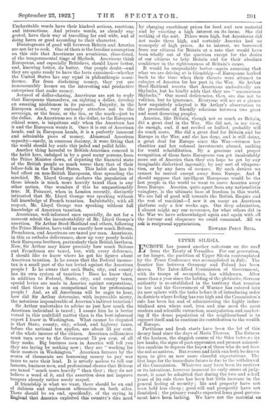HOW IT STRIKES AN AMERICAN.—III. ON EUROPEAN-AMERICAN RELATIONS. A MERICA, just
at present, is experiencing the favour of a good deal of attention abroad. Lord Balfour has unveiled his mind, and, we must presume, the mind of at least a majority of the British Government, in a Diplomatic Note, with a definite, if indirect, bearing upon the quality of American sentiment and morality. Mr. Lloyd George, in a speech in the House of Commons, has indicated his warm agreement with Lord Balfour's point of view. With these official expressions more than one unofficial British critic has swung into line.
Now M. Clemenceau announces he is crossing the Atlantic to give the Americans a "straight talk." Well, if they must have a talk—and I do not think they object at all to a talk—I am sure they would prefer, and very much prefer, a straight one to any other variety. Arguments among nations are all right—indeed, highly desirable— so long as they are straightforward, respectful, and friendly. If they are abusive, insolent, patronizing, self-righteous, homiletic, I am afraid they are profoundly undesirable, assuming, of course, that our objectives are international harmony and the blessings that inhere in it.
Not everything in the democratic world now—who fails to realize the fact ?—is as it should be. Numberless disintegrants are active. Forces of evil, driven under cover during the War, are re-emerging—issuing from their hiding-places in answer to an atmospheric murkiness pro- duced by those whose business it was, and who should have known how, to keep the air clear. Perhaps some of those of critical temper are actuated by deliberation. Perhaps they tell themselves a little lightning, a bit of thunder, a rush of wind, will purify the air. Let them have a care lest the wind gather unexpected volume and velocity. It might not stop at clearing the air. It might lay the fabric of democratic civilization flat. Disintegration of democratic strength, in exact ratio, is integration of auto- cratic strength. Neither monarchism nor communism is gone. Both are here and moving. Liberty always is menaced, as everything worth having always is menaced. Grave, indeed, is the responsibility of any inheritor of liberty, official or unofficial, if he say or do anything to breach the defences of a system that has.cost our forbears so heavily in acumen, audacity, toil, grief, and blood.
It is not only the official pen or tongue that can spill poison. Private pens and tongues can spill it, if not so copiously, quite as surely. We have just witnessed the fathering upon Mr. Kipling of an interview in an American newspaper in which he was represented to have said some very harsh things about Americans. Roughly, all good Americans had been killed in the Civil War ; those who survived were poor stuff. Americans, as a result of the War, had got England's gold. Englishmen, though frightfully impoverished by the War, had saved their souls.
Mr. Kipling has repudiated the alleged interview. He declares he gave no interview. He asserts he did not say any of the things ascribed to him. He does not add to his denial any emollient phrases addressed to wounded American susceptibilities, but he does brand the reputed conversation with him as a manufacture out of whole cloth. While most Americans feel Mr. Kipling never has understood them, never has liked them, belongs, at the core of his nature, to the men who sundered Anglo-Saxon solidarity, they will accept without question his statement that he did not authorize this interview.
Can we learn a lesson from the remarks ascribed, though wrongly, to Mr. Kipling ? To put poison into the blood- stream of the body politic is easy ; almost baffling is the task of getting it out. What is a day, an hour, in entering may require years for its removal—if it ever can be removed. Is Mr. Kipling, is many another man of more or less note in this country, certain he never, thoughtlessly, in private talk, has uttered words that might embitter England against America, and, in turn, America against England ? Many Americans, I fear, have done this sort of thing. Uncharitable words have their kindred actions, reactions, and interactions. And private words, as already sug- gested, have their way of travelling far and wide, and of doing harm or good according to their character.
Disintegrants of good will between Britain and America are not far to seek. One of them is the familiar assumption on this side that Americans are avaricious, close-fisted, of the temperamental tinge of Shylock. Americans think Europeans, and especially Britishers, should know better, and, knowing better, do better. Our people doubt—and they are quite ready to have the facts examined—whether the United States has any equal in philanthropic muni- ficence. Far from disdaining money, they yet are immeasurably keener on the interesting and productive enterprises that make money. Accused of dollar-chasing, Americans are apt to reply that Europeans themselves, on sighting a dollar, develop an amazing nimbleness in its pursuit. Iniquity, in the European mind, very curiously attaches not to the sovereign, or the franc, or the lira, or the mark—just to the dollar. As Americans see it the dollar, to the European ethical sense, is iniquitous only when the American has it and the European wants it. Once it is out of American hands, and in European hands, it is a perfectly innocent and admirable piece of money. Abnormal American rapacity—surely, in common decency, it were fitting that the world should lay aside this jaded and pallid fable. Another thing harmful to British-American concord is the habit here, indulged in by a good many persons, from the Prime Minister down, of depicting the financial state of the British people as much worse than that of their fellow-folk in the United States. This habit also has its bad effect on non-British Europeans, thus spreading the mischief. Mr. Lloyd George declares the population of these islands is much more heavily taxed than is any other nation. One wonders if this be unquestionably true. M. Poincare, when in London recently, distinctly intimated that Mr. Lloyd George was speaking without full knowledge of French taxation. Indubitably, with all respect, Mr. Lloyd George was speaking without full knowledge of American taxation.
Americans, well-informed ones especially, do not for a moment admit the incontestability of Mr. Lloyd George's assertion. Sir Arthur Steel-Maitland and others, following the Prime Minister, have told us exactly how much Britons, Frenchmen, and Americans are taxed per man. Americans, in this ex cathedra deliverance, show up very poorly beside their European brethren, particularly their British brethren. Now, Sir Arthur may know precisely how much Britons and Frenchmen are taxed, but, with every deference, I should like to know where he got his figures about American taxation. Is he aware that the Federal income- tax is a small part of the tax levied against the American people ? Is he aware that each State, city, and county has its own system of taxation ? Does he know that, in addition to Federal, State, city, and county taxes, special levies are made in America against corporations, and that there is an occupational tax for professional people ? And, as all Americans will be eager to hear, how did Sir Arthur determine, with impeccable nicety, the notorious imponderable of America's indirect taxation?
Sir Arthur undertakes to advise us just how much the American individual is taxed ; I assure him he is better versed in this multifold matter than is the best-informed expert I know in Washington. What cannot be disputed is that State, county, city, school, and highway taxes, before the national tax applies, are about 33 per cent. of the whole income of the citizen. American millionaires must turn over to the Government 75 per cent, of all they make. Big business men in America will tell you they are laying by nothing now ; they are "working for their masters in Washington." American farmers by the scores of thousands are borrowing money to pay war taxes to save their land. It is utterly useless to tell our farmers, business men, and professional classes that Britons are taxed "much more heavily" than they ; they do not believe a word of it, and the assertion does not improve tempers already rather sorely rasped. If friendship is what we want, there should be an end of dubious and unpleasant affirmation on both sides. There should be an end, specifically, of the saying in England that America exploited this country's dire need by charging exorbitant prices for food and raw material and by exacting a high interest on its loans. She did nothing of the sort. Prices were high, but Americans did not make them high, and certainly America had no monopoly of high prices. As to interest, we borrowed from our citizens for Britain at a rate that would have been wholly out of the question except for the desire of our citizens to help Britain and for their absolute confidence in the righteousness of Britain's cause.
It would be unspeakably better—again assuming that what we are driving at is friendship—if Europeans harked back to the time when their throats were attuned to eulogies of America for her part in the War. Sir Arthur Steel-Maitland asserts that Americans undoubtedly are Shylocks, but he kindly adds that they are "unconscious Shylocks." Our moral deficiencies, then, are duo not to volition, but to ignorance. Everyone will see at a glance how exquisitely adapted is Sir Arthur's observation to the promotion of friendly relations between two great and most deserving peoples.
America, like Britain, though not so much as Britain, did a great deal in the War. She did not, in my view, do enough, and, if not reviled or bullied, probably will do much more. She did a great deal for Britain and for Europe in the War, and she has done, and is still doing, a great deal for Europe since the War—witness her charities and her colossal investments abroad, making for world rehabilitation. By a gracious and proper recognition of these facts Europeans can get incalculably more out of America than they can hope to get by any imaginable dialectical ingenuity, by any sort of vitupera- tion, or by any form of menace. By such devices we cannot be moved except away from Europe. And I should suppose that intelligent Europeans would be the last people in the world to want to move America away from Europe. America, quite apart from any nationalistic vainglory, is the ultimate base of freedom in this world. We are full of good will towards the British Empire and the rest of mankind—I saw it on many an American platform only a few weeks ago. Our deep admiration, I almost might say our reverence, for what others did in the War we have acknowledged again and again with all the fervour and eloquence we could command. All we ask is reciprocal appreciation.
EDWARD PRICE BELL.



































 Previous page
Previous page